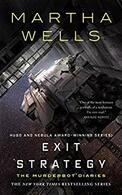
| Series: | Murderbot Diaries #4 |
| Publisher: | Tor.com |
| Copyright: | October 2018 |
| ISBN: | 1-250-18546-7 |
| Format: | Kindle |
| Pages: | 172 |
This is an ebook, so metadata may be inaccurate or missing. See notes on ebooks for more information.
Exit Strategy is the fourth of the original four Murderbot novellas. As you might expect, this is not the place to begin. Both All Systems Red (the first of the series) and Rogue Protocol (the previous book) are vital to understanding this story.
Be warned that All Systems Red sets up the plot for the rest of the series, and thus any reviews of subsequent books (this one included) run the risk of spoiling parts of that story. If you haven't read it already, I recommend reading it before this review. It's inexpensive and very good!
When I got back to HaveRotten Station, a bunch of humans tried to kill me. Considering how much I'd been thinking about killing a bunch of humans, it was only fair.
Murderbot is now in possession of damning evidence against GrayCris. GrayCris knows that, and is very interested in catching Murderbot. That problem is relatively easy to handle. The harder problem is that GrayCris has gone on the offensive against Murderbot's former client, accusing her of corporate espionage and maneuvering her into their territory. Dr. Mensah is now effectively a hostage, held deep in enemy territory. If she's killed, the newly-gathered evidence will be cold comfort.
Exit Strategy, as befitting the last chapter of Murderbot's initial story arc, returns to and resolves the plot of the first novella. Murderbot reunites with its initial clients, takes on GrayCris directly (or at least their minions), and has to break out of yet another station. It also has to talk to other people about what relationship it wants to have with them, and with the rest of the world, since it's fast running out of emergencies and special situations where that question is pointless.
Murderbot doesn't want to have those conversations very badly because they result in a lot of emotions.
I was having an emotion, and I hate that. I'd rather have nice safe emotions about shows on the entertainment media; having them about things real-life humans said and did just led to stupid decisions like coming to TransRollinHyfa.
There is, of course, a lot of the normal series action: Murderbot grumbling about other people's clear incompetence, coming up with tactical plans on the fly, getting its clients out of tricky situations, and having some very satisfying fights. But the best part of this story is the reunion with Dr. Mensah. Here, Wells does something subtle and important that I've frequently encountered in life but less commonly in stories. Murderbot has played out various iterations of these conversations in its head, trying to decide what it would say. But those imagined conversations were with its fixed and unchanging memory of Dr. Mensah. Meanwhile, the person underlying those memories has been doing her own thinking and reconsideration, and is far more capable of having an insightful conversation than Murderbot expects. The result is satisfying thoughtfulness and one of the first times in the series where Murderbot doesn't have to handle the entire situation by itself.
This is one of those conclusions that's fully as satisfying as I was hoping it would be without losing any of the complexity. The tactics and fighting are more of the same (meaning that they're entertaining and full of snark), but Dr. Mensah's interactions with Murderbot now that she's had the time span of two intervening books to think about how to treat it are some of the best parts of the series. The conclusion doesn't answer all of the questions raised by the series (which is a good thing, since I want more), but it's a solid end to the plot arc.
The sequel, a full-length Murderbot novel (hopefully the first of many) titled Network Effect, is due out in May of 2020.
Reviewed: 2020-02-22